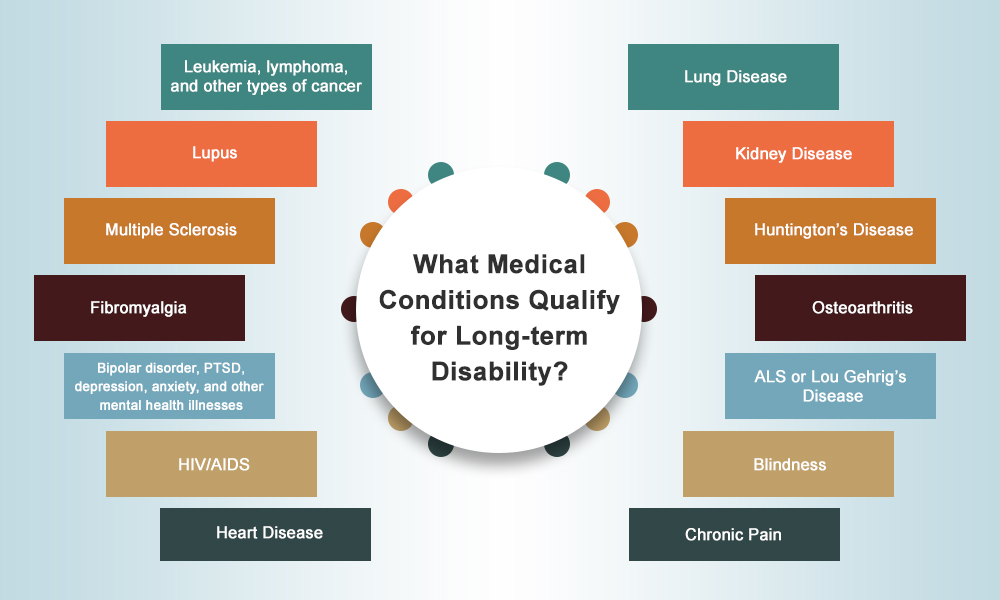If you have a medical condition that is expected to last for at least 12 months or result in your death, you may be eligible for long-term disability benefits. Benefits provided and the medical conditions that you need to qualify for them are defined in the terms of a long-term disability insurance policy that you purchase on your own or is made available through your employment
Long-term disability benefits may also be available through disability programs of the Social Security Administration. The SSA has a listing of impairments, which is also referred to as the “Blue Book,” containing a list of medical and mental health impairments that automatically meet the disability criteria used by Social Security to evaluation medical conditions.
A consultation with a disability lawyer at Liner Legal Disability Lawyers helps you determine the proper source of long-term disability benefits based on your medical condition. The information that follows offers an overview of long-term disability and some of the medical conditions that may allow you to qualify for benefits.
How does long-term disability work?
Disability programs, whether through private insurance policies or government programs, pay benefits to eligible people who cannot work because of an illness or injury. Many states have programs that pay benefits for short-term disability, which is generally defined as being unable to work for anywhere from three months to a year depending on the terms of the policy or insurance program.
Long-term disability insurance policies or the Supplemental Security Income and Social Security Disability Insurance programs through the SSA pay benefits for long-term disabilities. Social Security defines a qualifying disabling physical or mental impairment as one expected to last for at least 12 months or result in the person’s death. Private insurance policies have their own definitions of long-term disability, but an insured must usually be unable to work for at least 12 months.
Insurance companies providing long-term disability coverage to workers may define a disability as limited to your current occupation. Other insurance plans, and the disability programs through Social Security, require you to be unable to do any type of gainful employment in order to be eligible for benefits.

What medical conditions qualify for long-term disability?
If you have coverage through a long-term disability insurance policy, it will define and/or list medical conditions that qualify for benefits. A typical policy may include the following medical conditions as making you eligible to file a claim:
- Leukemia, lymphoma, and other types of cancer.
- Lupus.
- Multiple sclerosis.
- Fibromyalgia
- Bipolar disorder, PTSD, depression, anxiety, and other mental health illnesses.
- HIV/AIDS.
- Heart disease.
- Lung disease.
- Kidney disease.
- Huntington’s Disease.
- Osteoarthritis.
- ALS or Lou Gehrig’s disease.
- Blindness.
- Chronic pain.
Because so many illnesses and injuries may qualify for long-term disability benefits based on the terms of specific policies, you should consult a disability lawyer at Liner Legal Disability Lawyers who can help you file an application for benefits or appeal the denial of a claim.
What medical conditions qualify for long-term disability through Social Security?
Each of the Social Security programs that pay monthly benefits for long-term disability uses the Blue Book in evaluating applications to determine whether a mental or physical impairment qualifies for disability benefits. If you have a medically determinable condition matching one of the listed impairments, it means that you are disabled under SSA guidelines.
The listings include symptoms and laboratory for medical conditions severe enough to meet the standard used to define “disability” for the following systems of the body:
- Musculoskeletal disorders
- Special senses and speech
- Respiratory disorders
- Cardiovascular system disorders
- Digestive system disorders
- Genitourinary disorders
- Hematological disorders
- Skin disorders
- Endocrine disorders
- Congenital disorders that affect multiple body systems
- Neurological disorders
- Mental disorders
- Cancer
- Immune system disorders
Specific types of medical and mental health conditions that match a listed impairment include:
- Amputation
- Chronic joint pain
- Asthma and chronic obstructive pulmonary disease (COPD)
- Arrhythmia and congenital heart disease
- Sickle cell disease
- Bipolar disorder
- Depression and anxiety
- Parkinson’s disease
- Traumatic brain injury
- Lou Gehrig’s disease or ALS
A physical or mental impairment that does not match an impairment in the listings still may qualify for benefits through either SSI or SSDI. It must be proven with medical records and other evidence that the impairment prevents you from engaging in substantial gainful activities and is expected to last for at least 12 months or result in death.
Unlike a listed impairment that is presumed to be severe enough to cause you to be disabled, applications based upon impairments that do not match a listed impairment undergo an additional review to determine whether it prevents you from doing a recent type of work. If it does, the next thing to be considered is whether it prevents you from engaging in other types of work with consideration given to your age, experience, and physical limitations.
Get help from Liner Legal Disability Lawyers
Learn about which medical conditions qualify for a long-term disability during a free consultation with an SSD lawyer at Liner Legal Disability Lawyers. Our lawyers handle everything from initial applications for benefits to appeals of a denial of benefits.







